The Operating System’s GLOSSARIUM: UNSILENCED TEXTS series was established in early 2016 in an effort to recover silenced voices outside and beyond the canon, seeking out and publishing both contemporary translations and little or un-known out of print texts, in particular those under siege by restrictive regimes and silencing practices in their home (or adoptive) countries. We are committed to producing dual-language versions whenever possible.
Few, even avid readers, are aware of the startling statistic reporting that less than three percent of all books published in the United States, per UNESCO, are works in translation. Less than one percent of these (closer to 0.7%) are works of poetry and fiction. You can imagine that even less of these are experimental or radical works, in particular those from countries in conflict with the US or where funding is hard to come by.
Other countries are far, far ahead of us in reading and promoting international literature, a trend we should be both aware of and concerned about—how does it come to pass that our attentions become so myopic, and as a result, so under-informed? We see the publication of translations, especially in volume, to be a vital and necessary act for all publishers to require of themselves in the service of a more humane, globally aware, world. By publishing 7 titles in 2019, we stand to raise the number of translated books of literature published in the US this year by a full percent. We plan to continue this growth as much as possible.
Our translations and translingual texts thus far include work originally published and/or written in Arabic, Aramaic, Akkadian, French, Faroese, German, Hebrew, Persian (Farsi), Polish, Yaqui Indigenous American, Yiddish, and Spanish from Cuba, Argentina, Mexico, Uruguay, Bolivia, and Puerto Rico.
The term ‘Glossarium’ derives from latin/greek and is defined as ‘a collection of glosses or explanations of words, especially of words not in general use, as those of a dialect, locality or an art or science, or of particular words used by an old or a foreign author.’ The series is curated by OS Founder and Managing Editor Elæ Moss [née Lynne DeSilva-Johnson,] with the help of global collaborators and friends.
You can find all of these titles on our Open Access Library by navigating through our TRANSLATION and TRANSLINGUAL options, or by searching for the GLOSSARIUM series.
GLOSSARIUM TITLES, 2018-20
*In the Drying Shed of Souls: Poetry from Cuba’s Generation Zero (Anthology); Edited / with translations by Katherine Hedeen and Víctor Rodríguez Núñez; Spanish-English dual language edition with selections from Luis Yuseff, Isaily Pérez González, Javier Marimón Miyares, Leymen Pérez García, Marcelo Morales Cintero, Oscar Cruz, Liuvan Herrera Carpio, Jamila Medina Ríos, Moisés Mayán Fernández, Legna Rodríguez Iglesias, and Sergio García Zamora [Cuba]
*Street Gloss: Brent Armendinger with translations from Alejandro Méndez, Mercedes Roffé, Fabián Casas, Diana Bellessi, and Néstor Perlongher – translingual experimental text [Argentina]
*Operation on a Malignant Body (Operación al Cuerpo Enfermo) – Spanish-English dual language, Sergio Loo (trans. Will Stockton) [Mexico]
*Are there Copper Pipes in Heaven (Eru Koparrør Í Himmiríki), Katrin Ottarsdóttir (trans. Matthew Landrum) [Faroe Islands]
*Kawsay : The Flame of the Jungle, by María Vázquez (trans. Margaret Randall); Spanish – English Dual Language Edition [Mexico]
*High Tide of The Eyes, by Bijan Elahi (trans Rebecca Ruth Gould and Kayvan Tahmasebian); Farsi – English Dual Language Edition [Iran]
*Dreaming (Śnienie), by Marta Zelwan/Krystyna Sakowicz (trans. Victoria Miluch); Polish-English Dual Language Edition [Poland]
*Alparegho, Pareil-à-rien / Alparegho, like nothing else, by Hélène Sanguinetti (trans. Ann Cefola); French-English Dual Language Edition [France]
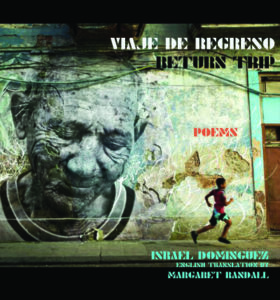 “Viaje al Regreso / Return Trip,” a dual language edition of Cuban poet Israel Dominguez’s striking poetry, with a beautiful cover featuring Havana street art by Jose Parla and JR. (trans. Margaret Randall)
“Viaje al Regreso / Return Trip,” a dual language edition of Cuban poet Israel Dominguez’s striking poetry, with a beautiful cover featuring Havana street art by Jose Parla and JR. (trans. Margaret Randall)
Margaret Randall’s clear and lively translation of Viaje de Regreso / Return Trip invites us into the life and work of a poet born in the early 1970s, nearly 25 years into the Revolution. Domínguez’s poems represent the lyric tradition in the best sense; they are poems investigating the emotion of the experience living in one’s body, in one’s mind. Written from a photograph or a memory, these poems explore love, family, spirituality, material reality. Many of these poems are dedicated to friends, family, mentors, and attest to a relationality and love that’s both humbling and inspiring. In these poems of dense image and rich sensation, Randall presents us with the gift of her translation of Israel Domínguez’s poetry.” – Stephen Motika
A breathtaking book by a major Cuban poet. Margaret Randall’s translations beautifully embody Israel Dominguez’s yearning for a future of justice for all. His yearning is his gift to all of us who seek a different way of being in the world. The Return Trip is a welcome and necessary poetry.” – Demetria Martinez, recipient of an International Latino Book Award and an American Book Award for The Block Captain’s Daughter.
Viaje de Regreso / Return Trip is a compendium of nostalgia, in which a familiar street, an old photograph, or memory of when the trains ran on precision time take up residence in poems in which a mature philosophy of life breaks through a patina of childhood wonder. A clothesline becomes a highway. A plum tree calms the spirit. A public restroom holds a dark menace. A woman’s name floats in a swimming pool. A hero of the Great War looms upon the horizon. Through it all, the music and culture of the country to the north refuse to fade into oblivion; despite the ever-present weight of political attack from the United States, a love for its popular culture remains familiar and strong. The poet writes: “Glory belongs to my neighbor / who owns a Buick / and wears a lot of gold.”
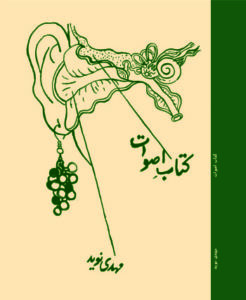 “The Book of Sounds,” a dual language edition in English and Farsi of Medhi Navid’s novelette, with cover art from Iman Raad.
“The Book of Sounds,” a dual language edition in English and Farsi of Medhi Navid’s novelette, with cover art from Iman Raad.
Unpublishable in Iran, ‘The Book of Sounds’ is poetic prose but, above all, it is an honest exploration of the socio-political context of contemporary Iran, the challenges, hopes and dreams of actual people living in this context, much like the book’s characters, among the pages of an episode— a space whose “door” is to be eventually “turned over as a page.
The sounds, as the story goes on, turn into the main filter through which the narration takes place. Throughout the book, the reader will notice an unconventional use of syntax, and a fresh approach to auditory imagery, which is uniquely married to the common logic of everyday words.
 Gregory Randall’s award winning memoir of life in Cuba, “Estar Allí Entonces / To Have Been There Then,” originally published in Uruguay to great acclaim in 2010. (trans. Margaret Randall)
Gregory Randall’s award winning memoir of life in Cuba, “Estar Allí Entonces / To Have Been There Then,” originally published in Uruguay to great acclaim in 2010. (trans. Margaret Randall)
“Gregory Randall has done it: written a captivating, ethically humane, and inspirational memoir of growing up in revolutionary Cuba as a child of exiled political activists. He is able to tell forthright yet loving stories of his engaged life with multiple fathers, escaping the 1968 military crackdown in Mexico as a seven year-old in charge of his younger siblings, forging friendships in Cuban boarding schools, and living his adolescence as an intellectual and political coming-of-age banquet among artists and revolutionaries from across the continent. He sees dogma and cant yet remains deeply committed to the vision of a liberated space and new women and men. Read this powerful book and be stirred anew to live fully in harmony with your values.” – Bernardine Dohrn
“Gregory Randall grew up in revolutionary Cuba. He left in 1983, and later he and his wife Laura relocated to Uruguay and Gregory established himself within the academic world there. Revolutionary Cuba’s literacy campaign in 1960-61, which sent young people into the mountains during a period that included the Bay of Pigs invasion, is generally recognized. Cuba’s far flung medical assistance in situations like the recent Haitian earthquake is also well-known. This book explores the more comprehensive Cuban effort to create what the Zapatistas call un otro mundo, another world. I know of no other book that so richly provides an empathetic view of the twentieth-century socialist project from both within and without. — Staughton Lynd
“To Have Been There Then is an extraordinary book. Gregory Randall recreates scenes from a revolutionary childhood and youth in Mexico and Cuba during the 1960s and 70s with brilliant vividness that brings an adult’s wisdom to the child’s perspective. He evokes the spirit of revolutionary consciousness of the era, when Cuba’s radical experimentation and commitment to building a new world intersected with revolutionary dreams and movements throughout Latin America. Randall’s childhood was peopled with artists, intellectuals, and revolutionaries from throughout the continent who shared a deep belief in the possibility for radical social change. Cuba’s revolutionary history is told here with verve and drama, through personal detail of a child and young man coming of age in truly historic circumstances.” – Aviva Chomsky, author of The Cuban Revolution, co-editor of The Cuba Reader: History, Culture, Politics.
“Here is the perfect book for this time of change in US-Cuban relations, and when a new generation in the United States has embraced the idea and goals of socialism and human solidarity. Gregory Randall’s exquisite coming of age story, set in Cuba during the second decade of the Cuban Revolution, is unflinchingly truthful and compassionate.” – Roxanne Dunbar-Ortiz, historian and author most recently of An Indigenous Peoples’ History of the United States.
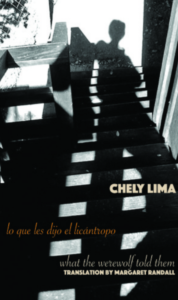 “Lo Que Les Dijo El Licantropo / What the Werewolf Told Them,” a dual language edition of Queer Cuban poet Chely Lima’s striking poetry, featuring a cover photo from the poet/artist. (trans. Margaret Randall)
“Lo Que Les Dijo El Licantropo / What the Werewolf Told Them,” a dual language edition of Queer Cuban poet Chely Lima’s striking poetry, featuring a cover photo from the poet/artist. (trans. Margaret Randall)
“Here is the strength of poetry for the world. Is it possible this book exists? I cannot be the only one who realizes I have been waiting all my life to read Chely Lima! The poet driving their own body in the trunk through the vast vulnerable fields of becoming human the way they want to become human in an inflexible world. Many thanks to Margaret Randall for these beautiful translations of one of the most brilliant books in many years! Chely Lima is here! Everyone tell everyone!” – CAConrad
Chely Lima’s poetry is exquisite and shines with a divinity. Dreamy, surreal and at other times pragmatic in their linguistic abilities, his poems defy any simplistic categorization. In fact, What the Werewolf Told Them begs of the reader to be read and read again. It is the transformative and mutability of the word that Chely captures in his work. In essence, he is a kaleidoscopic writer. Ever shifting. Ever evolving. His poems are songs of liberation, of journey. His words are signal-flares crafted into poems that tenderly and heartbreakingly convey the gender-transgressive voice and story of the author. Chely’s poetry is much like the stars, mythic but always startlingly real. Éste libro brilla con una cruda y estupenda tenacidad.” – Jessica Helen Lopez, City of ABQ Poet Laureate, Emeritus.
These are poems of astonishing courage and compelling craft. Their language sizzles on the page. The poet’s familiarity with history and his penchant for plumbing its most significant myths imbue these texts with a special richness. The myths come from the Greeks, Hindus, Germanic fairy tales, those drum beats brought to the New World by Africans during the ravages of the Middle Passage, and stories from indigenous America. Chely also creates some myths of his own.
“These poems are also gender-transgressive, revealing a personal journey as painful as it has been liberating. And it is a complicated journey. We cannot say the poet is only a man or that he was once a woman; such binary notions are themselves being challenged here. Body parts and the uses to which they are assigned in our inadequate society are routed from their comfort zones, made to look at themselves in a succession of mirrors and confronted head on. Chely refuses to play by society’s hypocritical rules—in his life or work.
“The poem called “Recognition” begins: “I am digging up my face, / which is to say all the faces of my tribe. / With difficulty I haul them from obscurity / and hang them from the insulting stakes / marking each of their graves, my grave.” And the poem ends: “I am rebuilding with one clenched fist / in my pocket. Rebuilding my tribe, / my face unmasked for the first time.” Chely’s power lies in being willing to take the reader to the depths of his agony while at the same time permitting us to glimpse a future, a way out of suffocation that is woven of his ability to imagine a world in which acceptance and dignity bloom.” – Margaret Randall, from the Introduction
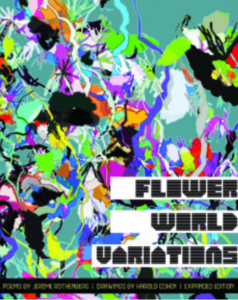 “Flower World Variations,” an expanded edition of the 1983 collaboration between poet Jerome Rothenberg and groundbreaking digital artist Harold Cohen
“Flower World Variations,” an expanded edition of the 1983 collaboration between poet Jerome Rothenberg and groundbreaking digital artist Harold Cohen
The process of translation is here re-imagined as a new wilderness by Jerome Rothenberg and Harold Cohen, in a multilayered composition of poems and computer generated drawings for the “human/other-than-human worlds” originally composed by the Yaqui poets of Arizona. An oral masterpiece, rendered masterfully. A moment to rejoice!” – Cecilia Vicuña
15 Flower World Variations. A revised & expanded version of Jerome Rothenberg’s variations on a set of traditional Yaqui Indian Deer Dance songs, with computer-generated drawings by Harold Cohen, one of our truly great pioneer computer artists. Originally published in a modest 1984 offset edition the book is newly enhanced in quality and features an updated introduction by Rothenberg and an excerpt from Cohen’s writings on the nature of mark-making and meaning/metaphor over a wide range of times and cultures. As such it serves also as a memorial and tribute to Harold Cohen, whose recent passing it helps to commemorate.
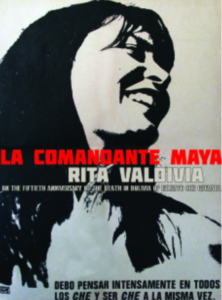 “La Comandante Maya: Rita Valdivia; On the Fiftieth Anniversary of the Death in Bolivia of Ernesto Che Guevara” (trans. Margaret Randall)
“La Comandante Maya: Rita Valdivia; On the Fiftieth Anniversary of the Death in Bolivia of Ernesto Che Guevara” (trans. Margaret Randall)
Who was Rita Valdivia? In October 2017, we commemorate the 50th anniversary of Che Guevara’s death in Bolivia, occasion for tributes throughout the world. Margaret Randall defies the absence of women’s stories in Che’s myth, bringing us the brilliant poetry and powerful personal history of this woman who died in combat just after her 23rd birthday. In a pre-feminist era and before she was 17, Rita named and escaped domestic violence. Not yet 20, she wrote poems that continue to astonish. At 22 she assumed a leadership role in Bolivia’s Army of National Liberation (ELN), the fighting force that took up the struggle for freedom where Che left off. La Comandante Maya reveals the life and legacy of one of the many women involved in an effort that, up to now, has publicized only a token female presence. Read testimonies of Rita Valdivia’s remarkable life by those who knew her best, and be astonished by her unique and lyrical poetry in bilingual format.
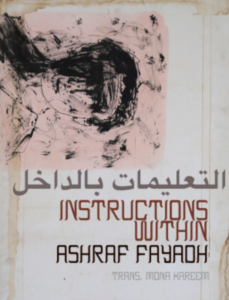 The first title in the series is an Arabic to English dual-language translation of Palestinian artist and poet Ashraf Fayadh’s 2008 collection, “Instructions Within,” translated by Mona Kareem, with Jonathan Wright and Mona Zaki, with additional English translation supervision by Ammiel Alcalay, Pierre Joris, and Lynne DeSilva-Johnson. All proceeds will go to support the fight against Fayadh’s ongoing sentence and imprisonment in Saudi Arabia.
The first title in the series is an Arabic to English dual-language translation of Palestinian artist and poet Ashraf Fayadh’s 2008 collection, “Instructions Within,” translated by Mona Kareem, with Jonathan Wright and Mona Zaki, with additional English translation supervision by Ammiel Alcalay, Pierre Joris, and Lynne DeSilva-Johnson. All proceeds will go to support the fight against Fayadh’s ongoing sentence and imprisonment in Saudi Arabia.
Je ne connaissais pas Ashraf Fayadh. Mais cette sentence nous renseigne sur sa poésie, sur sa force, sur sa violence. Les poètes sont des insurgés, porteurs de feu, compagnons de la vérité et de l’évidence. Ils sont la lumière qui éteint les ténèbres et donne les mots aux choses qui meurent de ne pas être dites. Ils sont fragiles et forts à la fois. Ils ne possèdent que leur souffle et leur âme qui résistent. On peut les frapper, les fouetter, les jeter au fond d’un puits, les enterrer vivants, leur voix continue de s’élever et réveille le monde.” – Tahar Ben Jelloun, for Le Point
[“I have not known Ashraf Fayadh, but this sentence teaches us all we need to know about his poetry — about his strength, about his violence. Poets are insurgents, carriers of fire, companions of truth and of evidence. They are the light which goes out into the darkness and gives words to things which die from not having been said. They are fragile and strong at the same time. They possess only their breath, their souls, who resist. We can hit them, whip when, throw them to the bottom of a well, bury them alive, but their voices continue to rise, and wake up the world”. – trans. Lynne DeSilva-Johnson ]


